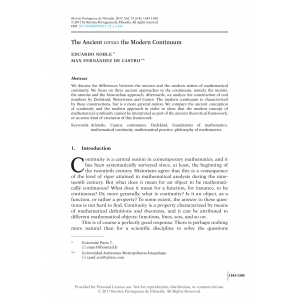Carlos Solis Santos. “El atomismo inane de Galileo.” Theoria 59 (2007): 213-231.
David Rabouin. “The Difficulty of Being Simple: On Some Interactions Between Mathematics and Philosophy in Leibniz’s Analysis of Notions”. In G. W. Leibniz, interrelations between Mathematics and Philosophy, edited by Norma Goethe, Philip Beeley and David Rabouin, 49-72. Dordrecht; Heidelberg; New York; London: Springer, 2015.
Eberhard Knobloch. “Galileo and Leibniz: Different Approaches to Infinity.” Archive for History of Exact Sciences, 54 (1999): 87-99.
Elad Lison. “The Philosophical Assumptions Underlying Leibniz’s Use of the Diagonal Paradox in 1672.” Studia Leibnitiana 38 (2006): 197-208.
Gottfried W. Leibniz. Sämtliche Schriften und Briefe. Edited by the Deutsche Akademie der Wissenschaften. Darmstadt, Leipzig, Berlin: Akademie-Verlag, 1923 et sq. [Quoted as A, followed by series (in Roman numerals), volume (in Arabic numerals) and page number. Ex.: A VII 6, 600].
Gottfried W. Leibniz. Quadrature arithmétique du cercle, de l’ellipse et de l’hyperbole et la trigonométrie sans tables trigonométriques qui en est le corollaire. Introduction, translation and notes by Marc Parmentier, latin text edited by Eberhard Knobloch. Vrin: Paris, 2004.
Gregory of Saint Vincent. Opus geometricum quadraturae circuli et sectionum coni. Anvers, 1647.
Joseph E. Hofmann. Leibniz in Paris, 1672-1676. His growth to mathematical maturity. Cambridge & New York: Cambridge University Press, 1974.
Manuel Sellés García. “La paradoja de Galileo.” Asclepio. Revista de Historia de la Medicina y de la Ciencia, 58, 1 (2006): 113-148.
Michel Serfati. “Order in Descartes, Harmony in Leibniz: Two Regulative Principles of Mathematical Analysis.” Studia Leibnitiana 45, 1 (2013): 59-96.
Michel Serfati. “‘On the Sum of All Differences’ and the Origin of Mathematics According to Leibniz: Mathematical and Philosophical Aspects.” In Perspectives on Theory of Controversies and the Ethics of Communication, edited by Dana Riesenfeld and Giovanni Scarafile, 69-79. Dordrecht; Heidelberg; New York; London: Springer, 2014.
Oscar M. Esquisabel. “Leibniz: las bases semióticas de la characteristica universalis.” Representaciones, 8, 1 (2012): 5-32.
Philip Beeley. “Approaching Infinity. Philosophical Consequences of Leibniz’s Mathematical Investigations in Paris and Thereafter.” In The Philosophy of the Young Leibniz, edited by Mark Kulstad, Mogens Laerke, and David Snyder, David (Studia Leibnitiana Sonderheft 35), 29-48. Franz Steiner Verlag: Stuttgart, 2009.
René Descartes. Oeuvres de Descartes. Edited by Charles Adam and Paul Tannery. Vrin: Paris, 1897-1910. [Quoted as AT, followed by the volume in Roman numbers].
Richard T. Arthur. “Actual Infinitesimals in Leibniz’s Early Thought.” In The Philosophy of the Young Leibniz, edited by Mark Kulstad, Mogens Laerke, and David Snyder, David (Studia Leibnitiana Sonderheft 35), 11-28. Franz Steiner Verlag: Stuttgart, 2009.
Samuel Levey. “Leibniz on Mathematics and the Actually Infinite Division of Matter.” The Philosophical Review 107, 1 (1998): 49-96.
Samuel Levey. “Comparability of Infinities and Infinite Multitude.” In G. W. Leibniz, interrelations between Mathematics and Philosophy, edited by Norma Goethe, Philip Beeley and David Rabouin, 157-187. Dordrecht; Heidelberg; New York; London: Springer, 2015.
Thomas Hobbes. The English Works of Thomas Hobbes. Edited by William Molesworth, London: Bohn, 1839, vol. 1.
Ursula Goldenbaum. “Indivisibila Vera – How Leibniz Came to Love Mathematics Appendix: Leibniz’s Marginalia in Hobbes’ Opera Philosophica and De Corpore.” In Infinitesimal Differences: Controversies between Leibniz and his Contemporaries, edited by Ursula Goldenbaum and David Jesseph, 67-76. Berlin and New York: Walter de Gruyter, 2008.









